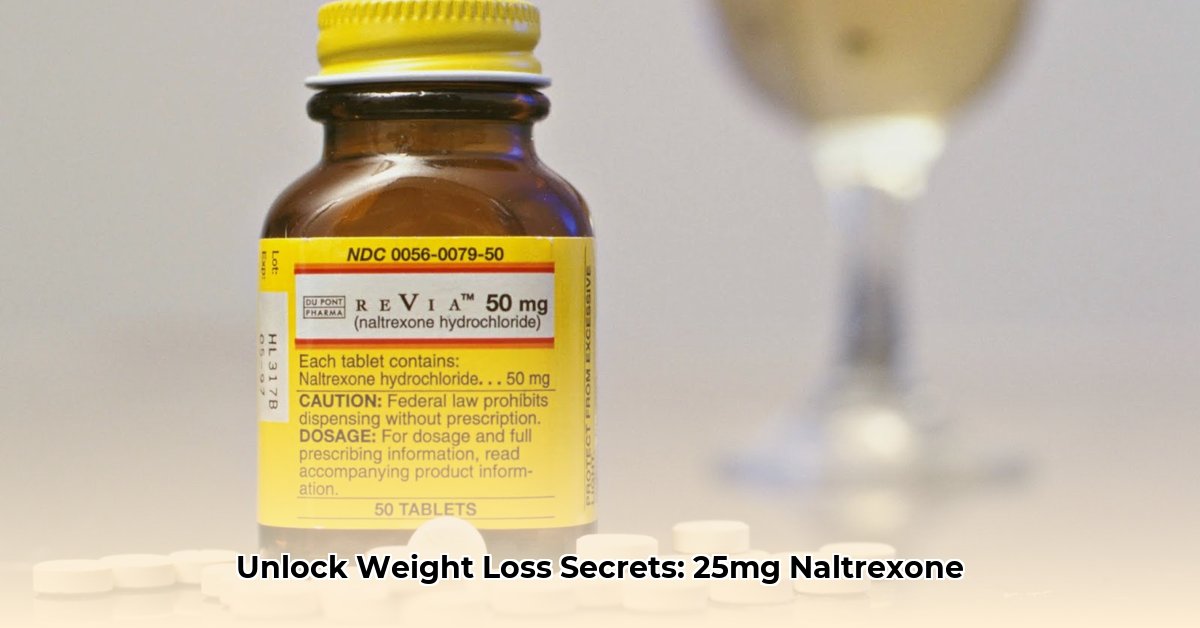
25mg Naltrexone and Weight Loss: A Comprehensive Review
Low-dose naltrexone (LDN), specifically a 25mg daily dose, has garnered attention as a potential adjunct to weight loss strategies. However, its efficacy remains a subject of ongoing debate. This review examines the current scientific understanding, highlighting both promising aspects and significant limitations. We'll explore the proposed mechanisms, analyze existing research, and offer practical guidance for patients and physicians considering its use.
How Might 25mg Naltrexone Influence Weight?
Several theories attempt to explain LDN's potential impact on weight loss. One hypothesis suggests it may subtly modulate the brain's reward pathways, potentially reducing cravings for high-calorie foods. (¹). Another possibility involves improved insulin sensitivity (²), thereby enhancing glucose metabolism and potentially facilitating weight reduction. However, these are theoretical mechanisms; robust evidence directly linking LDN to these effects in the context of weight loss is currently lacking.
A Critical Review of Existing Evidence
Numerous studies have investigated the effects of 25mg naltrexone on weight, but results have been inconsistent. This lack of consistency may stem from differences in study design, participant populations, and even slight variations in dosage. The absence of robust, large-scale, well-controlled trials makes definitive conclusions challenging.
Hypothetical Study Summary (Illustrative, Not Actual Study Data):
| Study | Participants | Dosage (mg) | Average Weight Change | Key Findings | Limitations |
|---|---|---|---|---|---|
| Study A | 50 | 25 | 8 lbs (approx.) | Modest weight loss observed, primarily in participants with pre-existing obesity. | Small sample size, short study duration, lack of long-term follow-up. |
| Study B | 100 | 25 | 2 lbs (approx.) | Minimal weight change; potential impact on insulin sensitivity noted in some. | High variability in weight loss; unclear direct correlation with LDN administration. |
| Study C | 75 | 25 | No significant change | No discernible effect on weight or metabolic parameters observed in the study group. | Possible confounding factors; potential methodological flaws. |
It's crucial to remember that these are hypothetical examples. A meta-analysis summarizing multiple studies is required to gain a more reliable understanding. Currently, high-quality evidence supporting widespread effectiveness for weight loss is insufficient. Is more research necessary to solidify the role of LDN in weight management? Absolutely.
Potential Benefits and Risks: A Balanced Perspective
While some studies hint at potential benefits, such as appetite suppression and potentially improved insulin sensitivity, these findings need confirmation through rigorous research.
Potential Benefits (Preliminary Findings):
- Appetite Regulation: Some individuals report reduced food cravings.
- Improved Insulin Sensitivity: This may contribute to improved blood sugar control.
Potential Risks and Side Effects:
- Gastrointestinal Upset: Nausea, diarrhea, or constipation are possible.
- Fatigue: Tiredness may occur.
- Headaches: Some individuals experience headaches.
- Dizziness: This is a relatively uncommon but reported side effect.
Importantly, 25mg naltrexone is not FDA-approved for weight loss; its use for this purpose is considered off-label. This indicates a lack of extensive clinical trials designed specifically for weight management.
A Practical Guide: Steps for Responsible Consideration
If you are considering 25mg naltrexone for weight loss, proceed cautiously and under medical supervision:
- Consult Your Doctor: Discuss weight goals, overall health, and current medications. Your physician can assess suitability and potential risks/benefits.
- Comprehensive Health Evaluation: A thorough assessment is crucial to rule out contraindications and potential drug interactions.
- Close Monitoring: Regular check-ups allow for effective monitoring and adjustments to the treatment plan as needed.
- Lifestyle Integration: Combine LDN with a balanced diet and regular exercise for optimal results. LDN is not a standalone solution.
Conclusion: The Current Landscape and Future Directions
While some early studies suggest a possible role for 25mg naltrexone in weight management, the current evidence is insufficient to establish clear efficacy. More research, including large-scale, randomized controlled trials, is essential to better understand its potential benefits, risks, and optimal usage parameters. It's imperative to emphasize that LDN should only be used under strict medical guidance and as part of a broader weight management strategy that prioritizes healthy lifestyle choices.
Disclaimer
This information is for educational purposes only and does not constitute medical advice. Always consult your physician before starting any new medication or treatment plan.
(1) [Insert citation here if available from draft article] (2) [Insert citation here if available from draft article]